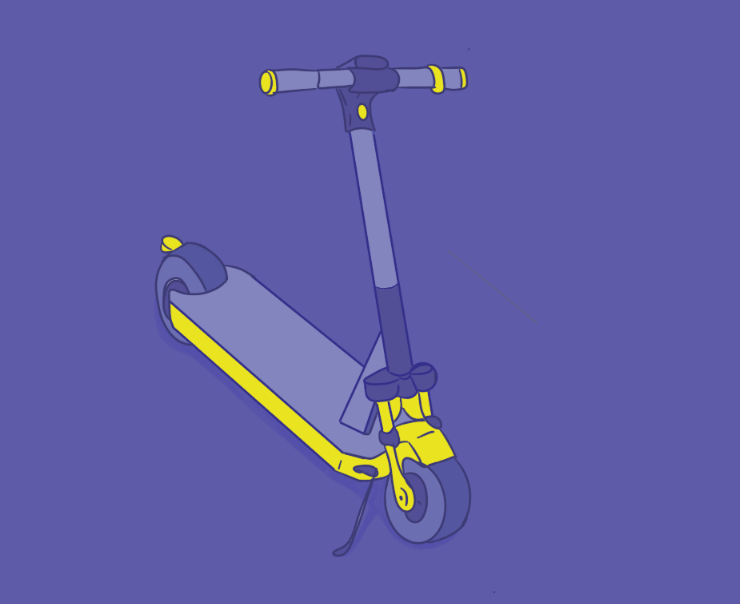Opinion | We owe our neighbors equal use of public space
November 5, 2021
In many American cities, the main public space is the sidewalk. Expanded outdoor dining and the increased use of mobile scooters and mopeds have highlighted both the scarcity of our public spaces and the line between public spaces and private ones.
Thoughtful use of public spaces such as sidewalks requires that people understand the social contract that governs communal services and spaces. It also requires reconsidering what it means to use public space and what we owe our neighbors.
The way we exist in public space isn’t always comfortable — physical space is limited and sometimes crowded, and there are rules and norms we follow that we might prefer to ignore. There are also concessions we make for the comfort and safety of others. In the U.S., people riding public transit are still required to wear masks, and Pitt enforces a similar policy in all University buildings. Some people might not believe masks work or feel that they are uncomfortable and inconvenient, but we wear them because it is part of a social contract — an agreement between people and the institution to follow certain rules in certain spaces.
This contract is part of our moral obligations to our neighbors, and doing the right thing means following it. Thomas Scanlon, a moral philosopher, argues that the morality of an action is based on the context of an agreement. In his book “What We Owe To Each Other,” Scanlon says that when an action is wrong, it is because it violates a principle that we’ve agreed to live by.
We cannot reasonably reject the principle that all people have full and equal access to public space. If we as a community believe that disabled people should have full use of public space, it becomes a violation of our principles to limit their access to that space.
In that context, when people block sidewalks with scooters or restaurants block walkways with outdoor dining tables it isn’t just inconvenient or rude, it is an ethical violation that discriminates against certain people in public spaces — it is an abdication of our responsibility toward other people. When someone chooses to ignore the principles of public space, they make that space less accessible for everyone. They also undermine the potential good of services like public dining or rentable transportation.
Spin scooters offer motorized transportation for residents without cars, and are an alternative to sometimes inconvenient bus transit. Spin offers discounted rates for lower income riders, and in Pittsburgh they are primarily being used in neighborhoods with a median income of around $45,000. They meet a need in a city where many residents don’t have access to a car or a license, and they are making neighborhoods more accessible.
Outdoor dining has changed our streetscapes and is expanding the ways we think about roads and public space. The increase in outdoor dining has been connected to a push for multi-use streets and open street planning. Outdoor dining also enabled many small businesses and restaurants to remain open amid pandemic restrictions, increasing their capacity, and it gave some service workers the ability to go back to work.
Misparked Spin scooters, misplaced trash and recycling bins, outdoor dining tents and tables make public sidewalks inaccessible for many community members. In the first seven weeks of the Spin scooter program in Pittsburgh, there were more than 600 complaints. The vast majority were related to illegally parked scooters. Wheelchair users, people who use mobility aids like canes and walkers and blind people are unable to safely use the sidewalks when they are blocked.
Some wheelchair users say they’ve had to ride in the road because sidewalks were too crowded by dining tables and outdoor eating tents. For visually impaired people, the obstacles on sidewalks sometimes force them to walk in the street, where there is a greater risk of being hit by a vehicle.
When some restaurants ignore ADA regulations by blocking sidewalks with tables, chairs and tents, they are preventing people from using public space. When individual scooter users ignore user guidelines and parking regulations by dropping scooters across walkways or parking them in the middle of sidewalks, they make sidewalks more dangerous for disabled people. These individual acts of discrimination are also undermining the collective good of services such as outdoor dining and scooters.
When restaurants take up sidewalk space, they are discriminating against disabled people and denying their right to use public space — whether it’s intentional or not. Acts that block access or functionally prevent disabled people from using space are discriminatory even when they are not malicious. When cities repeatedly allow this to happen, they are prioritizing private business over public accessibility. When you drop a scooter across the sidewalk you aren’t only being lazy and selfish — you are actively rejecting your moral obligation to your neighbors.
Nadiya Elyse Greaser is a queer, disabled writer who is interested in the intersections of identity and communal living. Write to her at [email protected].








